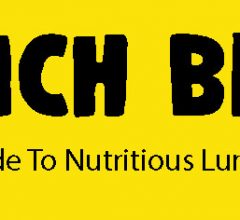Did you know? When we exercise, we not only increase strength, muscle growth, power and endurance, but we also increase inflammation within the body. Inflammation occurs as a response to tissue damage. Every training session causes microscopic damage to our muscle fibres and the inflammation process repairs this damage during the recovery period (2-48 hours post exercise).
Managing post exercise inflammation is essential to allow faster recovery, improve training adaptations and optimise performance in training and competitions.
What foods help to reduce inflammation?
Whole grains such as oats, brown rice and quinoa are recommended to help protect against inflammation. Some studies suggest high fibre foods can lower blood levels of the inflammatory marker C-reactive protein. Quinoa is a complete protein source, rich in fibre, magnesium, iron, B-vitamins and antioxidants making it an ideal recovery food.

Berries are rich in vitamin C along with various other minerals and antioxidants. Research suggests an increase in Vitamin C efficiency when combined with Vitamin E to reduce inflammation in the muscles during and after exercise.
Vitamin C is also responsible for the production of collagen, an essential connective tissue that helps repair tendons, ligaments and skin tissue.
Research suggests consuming a variety of berries (blueberries, strawberries, blackberries and raspberries) pre and post prolonged exercise to help reduce inflammation. Try adding them to some greek yoghurt for a healthy post workout snack.

Seeds such as chia, pumpkin, hemp and flax are all high in fibre, omega-3 fatty acids, protein and contain low amounts of inflammatory compounds. Omega-3 fatty acids found in chia and flax have been suggested to boost post-workout recovery and also help preserve lean muscle mass. Try snacking on a mixture of seeds after your workout or add a variety to your porridge, greek yoghurt or smoothie. Try our product range of Seed Mixes to help fight inflammation.

Spices such as cinnamon and ginger both have anti-inflammatory properties. Studies have indicated the consumption of 3g of either spice resulted in a shortened recovery time post high intensity exercise. Try adding some cinnamon to greek yoghurt, or some fresh ginger to your smoothie.
Turmeric contains an anti-inflammatory compound called “curcumin” which has been reported to reduce pain. This spice can easily be incorporated to stir-fries, soups and casseroles as well as smoothies.

Fatty Fish such as Salmon, Sardines and Mackerel are rich in essential Omega-3 Fatty Acids. These fatty acids are essential in our diet as our body cannot produce them. Research suggests these fats are one of the best food sources to aid recovery post exercise and reduce inflammation. Omega 3 also has the added benefit of playing a role in brain function, growth and development and reducing the risk of heart disease. If you’re in a hurry after your workout, try nibbling on some walnuts and almonds, or you can add some chia or flaxseed to your post workout smoothie. Here’s a great Salmon recipe to help you get those fatty acids.

Avocados are packed with anti-inflammatory properties due to their monounsaturated fat content along with Vitamin E, C and Fibre. Try adding them to your post-workout smoothie or combine with wholegrain bread and a poached egg.Check out our delicious recipe for Avocado Puree

Foods that promote inflammation
In order to reduce inflammation in the body, its important to also consider the removal of foods that promote inflammation such as meat, dairy, and processed foods high in preservatives.
Research suggests that saturated and trans fat can lead to inflammation. Processed and red meat tends to be high in these fats, so try to limit these in your diet to once or twice per week. Fried foods, pastries, cookies and processed snacks can contain hydrogenated and partially hydrogenated fats, these fats should be avoided from your diet.
Refined starches, including white bread, rice and pasta are broken down into sugar quite quickly in the body. This can cause inflammation, especially in high amounts. Added sugars such as glucose, fructose, molasses, corn syrup can also lead to inflammation.
Bye for now,
Sarah-Jayne.











